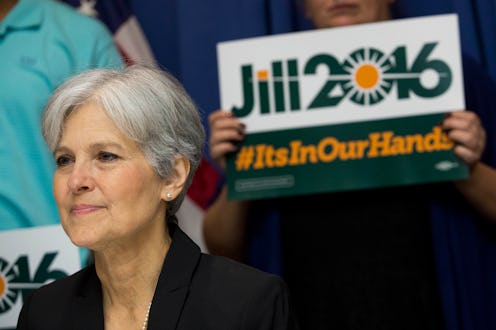Vermont Sen. Bernie Sanders' odds of winning the Democratic Party's presidential nomination are growing slim. But Jill Stein, the presumed presidential nominee of the Green Party, isn't giving up. In an open letter penned last week, Stein asked Sanders to collaborate on a political revolution that would work outside the boundaries of the Democratic Party establishment and finally crack the two-party system's rigid structure.
In her letter to Sanders, Stein wrote, "The Democratic machine has launched an unjust attack on your campaign — from the NY Daily News hit job to Paul Krugman's unfounded assault, the DNC's efforts to minimize your debate exposure, and the near-unanimous endorsement of Clinton by Democratic elected officials and super-delegates." She went on to suggest that Sanders join forces with her instead in order to open "a window of historic possibility outside the Democratic Party."
Stein — whose platform is arguably even more progressive than Sanders' on issues like gun control and Palestine — has been supportive of the senator's bid for president. But despite intensive fundraising and campaigning efforts by his large supporter base, Sanders' campaign has announced that it will be downsizing its campaign staff after several losses during Tuesday's primaries.
The main explanation the campaign gave for this decision was the need to focus its remaining resources on the states that haven't yet had primaries, it's also worried that it won't be able to keep up with past record-breaking fundraising. The road to the nomination isn't completely closed to Sanders, but as his chances dwindle, his supporters are looking for an equally viable alternative, and many of them have landed on Stein.
There have been numerous criticisms of the increasingly popular #BernieOrBust movement, but realistically, it makes sense for Sanders' supporters — especially those who are marginalized by the oppressive political system currently in place — to want to vote for a candidate who actually somewhat represents their interests. And while Stein's campaign, by virtue of a two-party system determined to prevent real change, hasn't made major waves quite yet, Sanders' supporters have the potential to shift the tide if he loses the nomination. If it is determined that Stein has the support of 15 percent of the national electorate, she would finally be eligible to participate in presidential debates with the Democratic and Republican nominees. Even 5 percent would have a significant impact, because the Green Party would then receive federal funding.
An argument against voting for Stein in the case of Sanders' loss seems to be the looming parallel between Stein's candidacy and that of Ralph Nader, who has been blamed by many Democrats for Al Gore's defeat at the hands of George W. Bush in 2000. But arguing this only serves to further affirm the two-party system as an acceptable status quo, and is an attempt to discourage third-party candidates from engaging in party-building. What revolution or major political change ever happened without people rising up and taking risks?
Might we see a Stein-Sanders ticket some time in the near future? Sanders hasn't openly responded to Stein's invitation yet, and he has already said he plans to stay in the race until every state has had the chance to vote in the primaries. But if he loses the nomination to Hillary Clinton, it might be worth it for him to consider either endorsing Stein or working with her to create some real political change. Major systemic overhauls don't happen overnight, and if Donald Trump is elected in November, Sanders' and Stein's supporters will not be responsible. Instead, we must reassess all the disadvantages of the two-party system and the ways in which it suppresses non-establishment political views and grassroots movement-building. If Stein and Sanders team up, they — with the support of other progressives like Elizabeth Warren — could change the two-party status quo once and for all.
